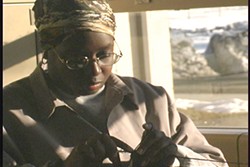Perversion of Justice in the drug war
After an 11-year fight, a Charlotte activist and California inmate find the cost of freedom
By Melissa MummertI was giddy as I approached the office of a federal prison camp set in the bleak, Victorville, Calif., desert. I had flown to California from Charlotte, then driven two hours in a rented KIA to be present at the moment Hamedah Hasan was released after serving 18 years.
"I'm here to pick up my friend!" I told the officer on staff, brightly. "She's supposed to be released in an hour."
"Wait in your car," the officer said, flatly.
My early-February trip to meet Hamedah was the culmination of an 11-year project that had become a deep friendship. In the summer of 2000, I served as a chaplain intern at a federal prison in Dublin, Calif. My job was to roam the institution and listen to the stories of female inmates. During my time there, I heard unspeakably tragic tales. Women told me they were serving 10 years, 20 years, and even life sentences for minor roles in nonviolent drug crimes.
Sitting each day with women affected by mandatory sentences, women who were weeping and pleading for help, got to me. I decided to use my skills from a prior career in television to make a video documentary about their plight.
That's how I met Hamedah, who became the subject of my documentary Perversion of Justice. Hamedah had been in an abusive relationship. Hoping to find a safe haven for herself and her daughters, she left her home state of Oregon and accepted an invitation to move in with a cousin in Nebraska. Over time, she agreed to wire money for her cousin and occasionally perform other errands for him. When police arrested him on charges of masterminding a crack-cocaine operation, Hamedah was hauled away with him.
Despite her limited involvement, prosecutors charged Hamedah Hasan as a conspirator. They asked her to testify against her cousin. She refused to cooperate with them and took her case to trial. She was found guilty. Because of the weight of the drugs in the case, Hamedah's judge was forced by mandatory sentencing guidelines to give her two life sentences. The judge later called the sentence "the most grotesque perversion of justice that I can think of."
Hamedah's tragic story is compounded by the fact that she is a loving mother of three girls: Kasaundra, Ayesha and youngest daughter Kamyra, who was born in prison.
All this happened to Hamedah at exactly the wrong time in our country's war on drugs. In the 1980s, Congress devised harsh mandatory minimum sentences, a one-size-fits-all, quick-fix approach to drug policy. Many states followed the lead of the federal government, instituting mandatory sentences that resulted in our country gaining the dubious distinction of having the highest incarceration rate in the world. North Carolina prisons now house more than 39,000 inmates, more than the number of people who live in Kannapolis. These mandatory sentences have been used frequently against low-level and mostly nonviolent offenders like Hamedah. Moreover, because Hamedah's case involved crack cocaine, the mandatory penalties were 100 times steeper than if she had been associated with a powder-cocaine operation.
That's the tragic part.
So, how did two life sentences turn into 18 years? I'd love to take full credit for Hamedah's release. During the seven years I was making my film, years in which Hamedah and I deepened our friendship through hundreds of letters, e-mails and visits, I admit that I had a fairy tale ending in mind: Millions would see my movie about Hamedah and the president himself would take notice and grant her an immediate pardon. Cue the orchestra.
It didn't work out that way. Neither President Bush nor President Obama exercised the power of the pen to pardon Hamedah.
What did happen was less dramatic but far more comprehensive. In the early '90s, ordinary Americans started to organize against the grotesquely unfair sentencing policies that ripped apart lives and families. Families Against Mandatory Minimums (FAMM), led by Julie Stewart, whose brother received a five-year mandatory sentence for selling marijuana, offered prophetic leadership on crack-cocaine sentencing reform.
Over 15 years, FAMM members, most of whom were friends and family of prisoners, made calls, sent e-mails, showed Perversion of Justice and other movies, wrote letters to editors, attended hearings and visited their legislators. At a glacial pace, opinions shifted and hearts changed. In the end, crack-cocaine penalties were changed and the changes were made retroactive, so they affected Hamedah and thousands of other prisoners.
Hamedah's two life sentences turned into 18 years because people cared enough to speak out. "It's incredibly rewarding to see people coming home as a result of our persistent pressure to make crack sentences more fair," says Stewart, who operates FAMM out of Washington, D.C. "Seeing families united as a result of crack-cocaine reform reminds me in the most tangible way that our work really does make a difference."
There is much more to do. Two million people remain incarcerated in this country. Hamedah and so many others, now that they are home, still face bleak odds of being welcomed fully into society. I work now with prisoners and former prisoners in Mecklenburg County, and hear each day how difficult it is to rebuild a life with a criminal record.
But we should take time to celebrate, too. While I was in my car waiting for Hamedah, she was writing in her journal: "After nearly 19 years of struggling and praying to reach this day, my freedom has a special meaning to me on so many levels. The circumstances [and] changes in the law leading to my release have re-affirmed my belief in how individual efforts pooled together can truly make a difference. I am filled with a sense of gratitude and humility that God allowed me to see and reap the benefit of such courageous individuals tirelessly pushing for change simply because something needed to be changed; a life's lesson I'll be sure to pass along."
At a few minutes before 9 a.m. on Feb. 7, 2012, the waiting was over. I watched as Hamedah Hasan came around a corner surrounded by about 25 other inmates, her friends. After saying their goodbyes, Hamedah saw me and, in one of the top three moments of my life — the others being my marriage and the birth of my daughter — I ignored the officer's instructions to stay in the car and ran into the arms of my friend.
Melissa Mummert works for the Charlotte non-profit Changed Choices, which helps women in transition. Learn more about Perversion of Justice at www.lifewithoutmovie.com.
Speaking of...
-

You Can Do Whatever You Want to Do
Feb 28, 2018 -

Who Run the World: Melissa Mummert
Mar 29, 2014 -

N.C. GOP keen to execute more black men
May 30, 2013 - More »
Latest in Commentary
Calendar
-

Wine & Paint @ Blackfinn Ameripub- Ballantyne
-

Queen Charlotte Fair @ Route 29 Pavilion
-

NEW WINDOW GALLERY-Pat Rhea-ACRYLIC PAINTINGS-April 05-30 2024 VALDESE, NC 28690 @ New Window Gallery/Play It Again Records
- Through April 30, 12 p.m.
-

TheDiscountCodes
-

Face to Face Foundation Gala @ The Revelry North End
-
Esports in Charlotte Takes Off: A Guide to Virtual Competitions and Betting
-
Homer's night on the town 41
If you drank a shot with the Knights mascot on Sept. 20, you were basically harboring a fugitive
-
Beauty Industry Trends To Look Out For In Charlotte In 2022









